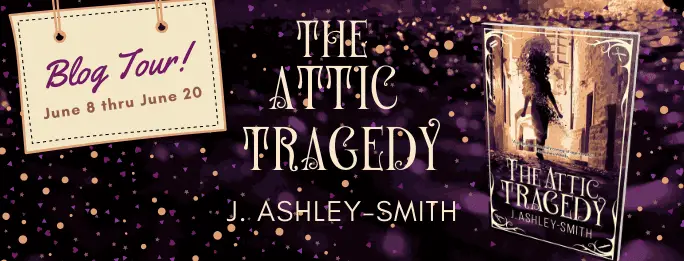The Attic Tragedy Blog Tour: “She’s alive!” – OR – Can a character really take over your story?

“She’s alive!” – OR – Can a character really take over your story?
By: J. Ashley Smith
I once read an interview with crime writer James Ellroy, who spoke bluntly when asked if his characters were flesh and blood. He said it was disingenuous for writers to say they had no control over their creations. The choices about their behaviour, their actions and reactions, did not arise independently – each was an artistic decision, made by him.
The Oscar-winning screenwriter Aaron Sorkin holds a similar, albeit more extreme position, describing the tendency of some authors to impute independent agency to their characters as ‘magical thinking’ – a politely belittling alternative to calling it ‘bullshit’. To Sorkin, there is no character beyond the words on the page. Characters do not ‘live’ beyond the individual choices that he, as author, makes for them; the specific traits or behaviours or actions that he chooses to show. If a character likes to drink warm lemonade, or is a hoarder with an obsession for dog-eared National Geographics, it is because room temperature soda and thrift store magazine collections are intrinsic to some dramatic purpose of Sorkin’s design. They exist on the page, in service to the story.
In this model of the author–character relationship, the author is a god, the character a figure made of clay into which the illusion of life is breathed.
Some part of me (the part that doesn’t balk at hard-boiled materialism) knows they are right. I know it. And yet—
No story I’ve ever written started working for me until one or other of the characters came alive. It doesn’t matter how good the idea. If I don’t get signs of life when I poke the protagonist with a stick, or hold a mirror up to their lips, that story is dead in the water. I’ve got folders in the cobwebbed and shadowy corners of my Dropbox full of stories that should have worked, but didn’t. And all because there was nothing there. No spark of electricity crackling down from that storm of an idea, to animate that approximation of a human form. No Bride of Frankenstein, “She’s alive!” moment. No surprises.
And then there are the stories that won’t die. Stories with ideas that don’t work, won’t work. Impossible stories that are too boring, or too terrible, or too obvious, or too hackneyed, yet which, somehow, persist. Stories I cannot finish, but cannot let go of, simply because the characters have grown legs of their own, have become substantial. They are ‘people’ now. As real as any of the memory-people knocking around inside my head. Realer, perhaps, because of how closely I have considered them, and over how long. They nag at me from the bottom drawer, “Don’t leave us here to decay. Don’t let us die without ever having lived. Don’t forget us.”
And then there are those – yes, entirely ‘magical’ – times when the character comes alive and tells you their story. You sit down at the page ready to write one thing and you’re taken off in this whole other direction, because your interest in the character demands it. Or because that character, now embodied in your imagination, demands it.
My novelette, The Attic Tragedy, was supposed to be about a girl who can see ghosts, who tries to cut that ethereal connection by some kind of barbaric operation. And, to a certain extent, it still is. Or would be, if it wasn’t for the protagonist George.
George did not exist when I began the story. She was the invisible protagonist (in my notes, she is simply ’N’ for ‘narrator’), the Nick Carraway who tells the sad tale of a girl Gatsby who doesn’t want to see ghosts anymore. But as I started to write it, something happened. George began to accrete, drew into herself patterns of behaviour, tragic flaws, a lumpen physicality, and so much pain she didn’t know what to do with it all. The more I wrote, the more I liked George. The more cruelly the story treated her (and, spoiler alert, it’s not called a ‘tragedy’ for nothing) the more human she became, the more I wanted her to have a life beyond the small idea I’d started off with. George took over.
And the story is all the better for it.
If I’d stuck ruthlessly to my original vision, the end result would have been one of those rather flat, monotone collections of words, a stack of electronic pages gathering dust in some forgotten cul de sac of my hard drive. If I’d even finished it, I would have hidden it away, disappointed that it hadn’t hit the mark I was aiming for. Whatever praiseworthy qualities the finished story now possesses are due in large part to George herself – not some real, flesh and blood George, but the George of my imagination, herself a ghost, that whispered to me her secrets.
Disingenuous it may be, ’magical thinking’ it almost certainly is, but what brings me back to the page day after day is the wonder, the delight of the unexpected, that can arise when a character has the space to express themselves in their own voice. In this relationship, the author’s role is to listen, to record those whispers, those secrets, as faithfully and unflinchingly as possible.
George came alive as I was writing her story and, to quote her own words, “for that I will love her forever.”
 THE ATTIC TRAGEDY by J. Ashley-Smith
THE ATTIC TRAGEDY by J. Ashley-Smith
RELEASE DATE: 6/9/20
GENRE: Dark Fantasy / LGBT / Novelette
BOOK PAGE: https://www.meerkatpress.com/
SUMMARY:
Sylvie never called them ghosts, but that’s what they were—not that George ever saw them herself. The new girl, Sylvie, is like a creature from another time, with her old-fashioned leather satchel, her white cotton gloves and her head in the clouds. George watches her drift around the edge of the school playing fields, guided by inaudible voices.
When George stands up for Sylvie, beating back Tommy Payne and his gang of thugs, it brings her close to the ethereal stranger; though not as close as George would have liked. In the attic of Sylvie’s father’s antique shop, George’s scars will sing and her longing will drive them both toward a tragedy as veiled and inevitable as Sylvie’s whispering ghosts.BUY
LINKS: Meerkat Press | Amazon | Indiebound | Book Depository | Barnes & Noble
ABOUT THE AUTHOR: J. Ashley Smith is a British–Australian writer of dark fiction and other materials. His short stories have twice won national competitions and been shortlisted six times for Aurealis Awards, winning both Best Horror (Old Growth, 2017) and Best Fantasy (The Further Shore, 2018).
J. lives with his wife and two sons in the suburbs of North Canberra, gathering moth dust, tormented by the desolation of telegraph wires.
EXCERPT 1:
Prologos
Sylvie never called them ghosts, but that’s what they were.
The day we became friends, she walked me through the darkened rooms of her father’s antique shop, trailing her fingers over the objects. All of them were lovingly cleaned, none with even a trace of dust. There were old books and reliquaries, trinket jars and model ships, barometers, credenzas, compendiums and lamps. There were music boxes and what I now know was a Minton hand-painted jardinière. Sylvie brushed them with her long pale fingers, her eyes aflutter, her voice so soft it was almost lost to the tinkle of the overhead chandeliers, the tick tick tick of the many hidden clocks.
“The woman who wore this lost her husband to madness.” Sylvie fingered an ornate ring, curlicued silver bordered with diamonds. “He disappeared when she fell pregnant and everyone thought him dead. He’d been gone three years when she read about him in the paper. He was living rough in Centennial Park, running naked and wild, biting the heads off geese.” She slipped the ring back into its padded velvet tray. “Her mother always said he’d come to no good.”
“Or this,” she said, and her fingers moved to the stem of a burnished brass telescope. “A lover’s memento. The woman who owned this took a keepsake from every man she fell for. Not one of them ever knew of her love. And none loved her in return. She died of loneliness and an overdose of laudanum, lifted from the Gladstone of a doctor she’d set her heart on.”
Sylvie swam between display cases with fluid movements, her touch as delicate as a butterfly. I hardly dared move, afraid my bulk would knock over some priceless curio, topple some fragile ancient thing.
“How do you know?” I asked and followed, squeezing between a bookcase and a mahogany sideboard. A blue glass vase wobbled on its shelf and I reached out to steady it. “D’you find all that on the Internet or something?”
“No, silly,” said Sylvie, eyes laughing. “They tell me.”
I thought she was teasing, so turned away, pretended I was examining the collectables. Beside us was a heavy leather-top desk, the surface inlaid with gold leaf that glittered faintly in the half-light. There was an old-fashioned cash register and a marble bust and, beside them, a black-and-white photo in a silver art deco frame. It was a portrait of a dark-haired woman with round faraway eyes and a haunting smile; just as Sylvie would look in ten years, twenty years—beautiful and tired and sad. But there was a spark in her eyes, as though she were smiling through the sadness, like a single beam of sunlight glimpsed through brooding clouds.
“And this one?” I said and reached to pick it up, but felt through my sweater a delicate touch. Sylvie’s hand on my arm.
I felt hot all over and prayed I wasn’t blushing. Every one of my scars was tingling. “What do you mean they tell you? Like you can . . . hear them?”
Sylvie looked up at me and frowned, her eyebrows furrowed and serious.
“Of course,” she said. “You mean you can’t?”

J. Ashley Smith
Author
J. Ashley Smith is a British–Australian writer of dark fiction and other materials. His short stories have twice won national competitions and been shortlisted six times for Aurealis Awards, winning both Best Horror (Old Growth, 2017) and Best Fantasy (The Further Shore, 2018).
J. lives with his wife and two sons in the suburbs of North Canberra, gathering moth dust, tormented by the desolation of telegraph wires.
You can connect with J. at spooktapes.net, or on Facebook, Twitter and Instagram.
The Attic Tragedy is available now from Meerkat Press.











